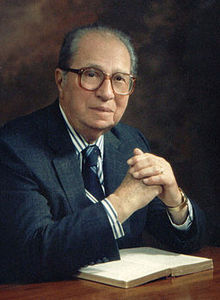Mortimer Adler
| Mortimer J. Adler | |
|---|---|

Adler while presiding over the Center for the Study of The Great Ideas
|
|
| Born |
Mortimer Jerome Adler December 28, 1902 New York City, New York, United States |
| Died | June 28, 2001 (aged 98) Palo Alto, California, United States |
| Era | 20th-century philosophy |
| Region | Western Philosophy |
| School | Aristotelian, Thomist |
|
Main interests
|
Philosophical theology, metaphysics, ethics |
Mortimer Jerome Adler (December 28, 1902 – June 28, 2001) was an American philosopher, educator, and popular author. As a philosopher he worked within the Aristotelian and Thomistic traditions. He lived for long stretches in New York City, Chicago, San Francisco, and San Mateo, California. He worked for Columbia University, the University of Chicago, Encyclopædia Britannica, and Adler's own Institute for Philosophical Research.
Adler was born in New York City on December 28, 1902, to Jewish immigrants. He dropped out of school at age 14 to become a copy boy for the New York Sun, with the ultimate aspiration to become a journalist. Adler soon returned to school to take writing classes at night where he discovered the works of men he would come to call heroes: Plato, Aristotle, Thomas Aquinas, John Locke, John Stuart Mill and others. He went on to study at Columbia University and contributed to the student literary magazine, The Morningside (a poem "Choice" in 1922 when Charles A. Wagner was editor-in-chief and Whittaker Chambers an associate editor). Though he refused to take the required swimming test for a bachelor's degree (a matter that was rectified when Columbia gave him an honorary degree in 1983), he stayed at the university and eventually received an instructorship and finally a doctorate in psychology. While at Columbia University, Adler wrote his first book: Dialectic, published in 1927.
In 1930 Robert Hutchins, the newly appointed president of the University of Chicago, whom Adler had befriended some years earlier, arranged for Chicago’s law school to hire him as a professor of the philosophy of law; the philosophers at Chicago (who included James H. Tufts, E.A. Burtt, and George H. Mead) had "entertained grave doubts as to Dr. Adler's competence in the field [of philosophy]" and resisted Adler's appointment to the University's Department of Philosophy. Adler was the first "non-lawyer" to join the law school faculty. Adler also taught philosophy to business executives at the Aspen Institute.
...
Wikipedia
